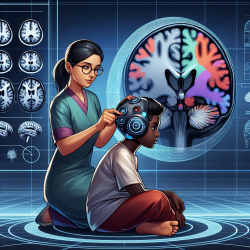Introduction
As practitioners committed to improving outcomes for children and individuals with neurodegenerative conditions, staying informed about the latest research is crucial. The study "Cognitive Performance After a One-Year Multidisciplinary Intensive Rehabilitation Program for Huntington’s Disease: An Observational Study" offers valuable insights into the effects of rehabilitation programs on cognitive performance in Huntington's Disease (HD) patients. This blog post will explore the study's findings and discuss how practitioners can apply these insights to enhance their therapeutic approaches.
Understanding the Study
The study conducted by van Walsem et al. (2018) aimed to assess changes in cognitive performance among patients with early to middle-stage HD following a one-year multidisciplinary rehabilitation program. This program included cognitive stimulation as a non-specific cognitive intervention alongside physical interventions. The study involved 31 participants who completed comprehensive neuropsychological assessments before and after the intervention.
Key Findings
- The Symbol Digit Modalities Test (SDMT) scores were significantly lower post-intervention, indicating ongoing cognitive decline.
- Other cognitive measures remained stable, suggesting that the rehabilitation program did not negatively impact cognitive performance.
- The study highlighted the need for randomized controlled trials to verify these findings and explore the potential of cognitive interventions in HD.
Implications for Practice
For practitioners, these findings underscore the importance of incorporating multidisciplinary approaches in therapy. Here are some actionable steps:
- Integrate Cognitive Stimulation: Incorporate cognitive stimulation activities, such as memory games and problem-solving tasks, into therapy sessions to potentially enhance cognitive functioning.
- Monitor Cognitive Changes: Use comprehensive neuropsychological assessments to track cognitive changes over time, allowing for personalized intervention strategies.
- Advocate for Multidisciplinary Programs: Encourage collaboration among physiotherapists, occupational therapists, and speech therapists to create holistic rehabilitation plans.
Encouraging Further Research
While the study provides valuable insights, it also highlights the need for further research. Practitioners can contribute to this field by:
- Participating in Research: Engage in studies that explore the impact of cognitive interventions on HD and other neurodegenerative diseases.
- Collaborating with Researchers: Work with academic institutions to design and implement studies that address gaps in current literature.
Conclusion
The study by van Walsem et al. offers promising insights into the role of multidisciplinary rehabilitation programs in maintaining cognitive performance in HD patients. By integrating these findings into practice and advocating for further research, practitioners can enhance therapeutic outcomes and contribute to the growing body of knowledge in this field.
To read the original research paper, please follow this link: Cognitive Performance After a One-Year Multidisciplinary Intensive Rehabilitation Program for Huntington’s Disease: An Observational Study.










